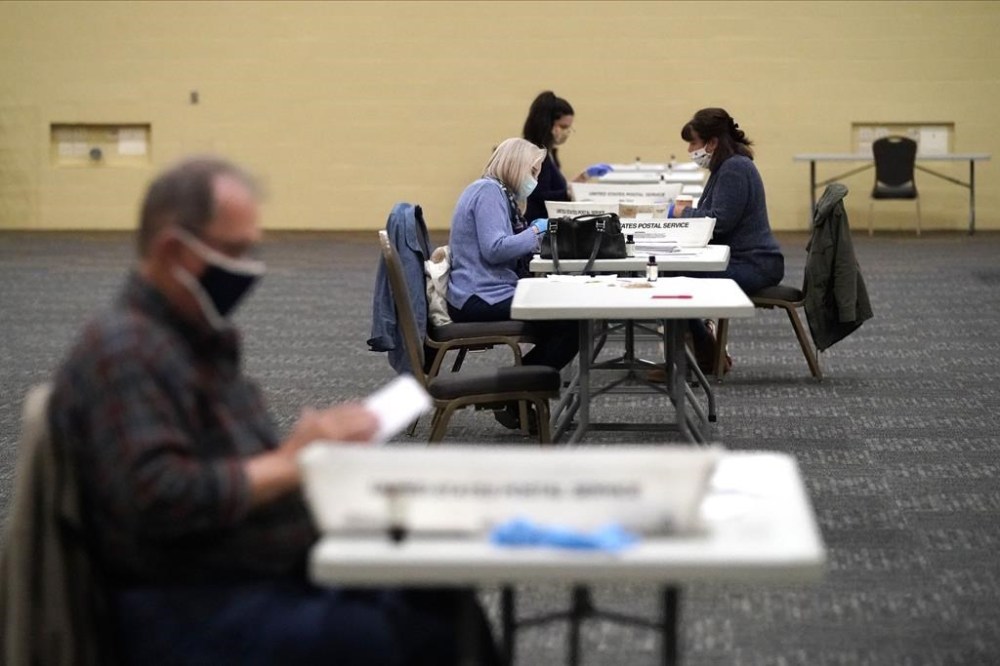Pennsylvania county says 2,500 voter registrations being investigated for possible fraud
Advertisement
Read this article for free:
or
Already have an account? Log in here »
To continue reading, please subscribe:
Monthly Digital Subscription
$0 for the first 4 weeks*
- Enjoy unlimited reading on winnipegfreepress.com
- Read the E-Edition, our digital replica newspaper
- Access News Break, our award-winning app
- Play interactive puzzles
*No charge for 4 weeks then price increases to the regular rate of $19.00 plus GST every four weeks. Offer available to new and qualified returning subscribers only. Cancel any time.
Monthly Digital Subscription
$4.75/week*
- Enjoy unlimited reading on winnipegfreepress.com
- Read the E-Edition, our digital replica newspaper
- Access News Break, our award-winning app
- Play interactive puzzles
*Billed as $19 plus GST every four weeks. Cancel any time.
To continue reading, please subscribe:
Add Free Press access to your Brandon Sun subscription for only an additional
$1 for the first 4 weeks*
*Your next subscription payment will increase by $1.00 and you will be charged $16.99 plus GST for four weeks. After four weeks, your payment will increase to $23.99 plus GST every four weeks.
Read unlimited articles for free today:
or
Already have an account? Log in here »
Hey there, time traveller!
This article was published 25/10/2024 (397 days ago), so information in it may no longer be current.
HARRISBURG, Pa. (AP) — A criminal investigation is underway in the crucial presidential battleground of Pennsylvania after election workers in one county flagged about 2,500 voter registration forms for potential fraud. Two other counties were alerted to look for similar problems.
The forms arrived at the Lancaster County elections office shortly before the state’s deadline to register this past Monday and were apparently part of a larger effort to sign people up, officials said Friday. Some had false names, suspicious handwriting, questionable signatures, incorrect addresses or other problematic details.
Two other unnamed counties received similar applications and were notified to check into them, Lancaster County District Attorney Heather Adams said at a news conference. She said election workers “noticed that numerous applications” had similarities, but officials did not indicate the volume of suspicious applications or say how many applications had already been fully investigated.

“It appears to be an organized effort at this point,” said Adams, an elected Republican. “But of course, it’s an ongoing investigation. And we’ll be looking into who exactly participated in it and how far up it goes.”
The set of applications has been segregated during the investigation, preventing ballots from being sent to or cast by people until they are deemed valid. Pennsylvania’s 19 electoral votes are being fought over as polls indicate the presidential contest in the state is a close race.
“The fact of the matter is, we’ve contained this,” Lancaster Commissioner Ray D’Agostino, a Republican who chairs the election board, said at the news conference. “This is not right. It’s illegal. It’s immoral. And we found it, and we’re going to take care of it.”
Adams and the county election board members did not say who dropped off the forms or whom they may have been working with.
D’Agostino said the applications were not limited to a single party and had been collected at various spots in Republican-majority Lancaster.
The Pennsylvania Department of State issued a statement Friday praising the elections workers “for their diligent work in spotting this potential fraud and bringing it to the attention of law enforcement.” The state attorney general’s office, which was also contacted by Lancaster officials, declined to comment.
About 3 in 5 of the applications that have so far been fully investigated have had problems, Adams said. Other applications among the 2,500 have been verified as accurate and are being processed as normal, she said.
Most of the applications were dated since Aug. 15, and a majority of them were from Lancaster City. Adams said the applications were collected as part of a “large-scale canvassing operation.”
“In some cases, applications contained correct personal identification information, such as the correct address, correct phone number, date of birth, driver’s license number and Social Security number — but the individuals listed on the applications informed detectives that they did not request the form,” Adams said. “They did not complete the form and verified that the signature on the form was not theirs.”

